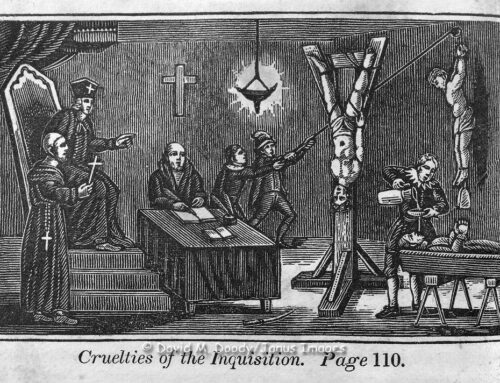Shoulder to Shoulder
Friday, February 18, 2022
By Joy Lucius
Reprinted from American Family Association
Barriers were prevalent in the panoramic story of the Bible, and rightly so. Those ancient nations and cities needed defensive walls of safety and protection. It is quite evident that the same is true today. A country without borders is said to be like a house without walls, destined to collapse.
On a personal level, the best defense truly is a good offense, especially if that offense involves strengthening relationships with our allies, those who share our core values.
That is exactly what the Center for Jewish-Christian Understanding and Cooperation (CJCUC) aims to do. They seek to build a bridge between Israel’s predominantly Jewish population and its Christian citizens through hospitality, hope, and practical help.
Rabbi Pesach Wolicki, executive director of CJCUC, shared with The Stand how their ministry strives to strengthen and grow the relationship between Jews and Bible-believing Christians at home and abroad.
Historic hurdles
To accomplish those goals, Wolicki hopes to extend the focus of Jewish-Christian relations well beyond the traditional political and financial support of the state of Israel by Christians.
But Wolicki openly recognizes obstacles to building the relationship between Christians and Jews. The cultural and religious differences are obvious and long-standing, but he is more concerned with what is held in common.
“Jews and Christians have been separated for far too long,” Wolicki remarked. “The time has come for us to recognize that we are partners in the unfolding story of the kingdom of God.”
Developing that divine partnership between Jews and Christians will also take time and patience.
“I just recently assumed this role,” explained Wolicki, “and will be launching a number of education initiatives to bring Jews and Christians into a stronger alliance and relationship around our shared biblical faith and values.”
Shared space
Those same values and faith are cornerstones of everyday life for the Wolicki family.
“Kate and I celebrated our 25th wedding anniversary this past March,” said Wolicki. “We have eight children, four boys and four girls, ranging in age from 12 to 24.”
Originally from Boston, Kate met her future husband in Jerusalem, but the couple now resides about 30 minutes outside the city in Bet Shemesh, Israel, in the same neighborhood as his mother and father, also a rabbi.
Once home to Samson, Bet Shemesh is located near the Elah Valley where David slew the giant Goliath. It is now home to a globally diverse group of around 150,000 residents, and this same diversity plays into Wolicki’s objectives for CJCUC.
“The goal of the relationship is the relationship itself,” declared Wolicki. “Jews and Christians worship the same God. We share Scripture. We share values. With these values, come shared political and cultural concerns. My ministry focuses on living in the shared space of the relationship.”
That shared space involves joint Bible study sessions, dialogue, and exchange of ideas between Jews and Christians in Israel and around the world. It also includes openly seeking new ground for connection and partnership.
Opening options
Since Wolicki travels as a lecturer and consults on various education-related projects for the International Fellowship of Christians and Jews (IFCJ), interesting opportunities to share new space arise.
“A few months ago,” Wolicki said, “we did an event for students at Regent University where a Christian theology professor and I discussed eschatology from the Jewish and Christian perspectives. We explored our differences and discovered some amazing commonalities that neither of us was previously aware of. It was amazing.”
Another incredible opportunity came through a new podcast called Shoulder to Shoulder. Podcasts are familiar to Wolicki as he has hosted The Baseball Rabbi since 2018, sharing the history and stats of his favorite sport of baseball.
“Shoulder to Shoulder,” Wolicki explained, “is co-hosted with my dear friend, Pastor Doug Reed, who pastors an Assemblies of God church in Youngstown, Ohio. We have in-depth discussions of issues that matter to all people of biblical faith – politics, cultural issues, theological issues, etc.”
No matter where he travels, “shoulder to shoulder” has become Wolicki’s rallying cry to all Jews and Christians to find common ground in their shared biblical beliefs and values.
The term references the end-time prophecy of Zephaniah 3:9: “Then I will purify the lips of the peoples, that all of them may call on the name of the Lord and serve him shoulder to shoulder.”
Several years back, while preparing to talk to a group of Christians, Wolicki found different biblical translations for the end of this verse: shoulder to shoulder; of one accord; with one consent. But no version accurately captured the Hebrew meaning of the last phrase of that verse.
True translation
“In Hebrew,” Wolicki said, “the end of the verse is ‘that all of them may call on the name of the Lord and serve him shechem echad – literally, ‘as one shoulder.’ Without shechem echad, a powerful message was lost in translation.”
The standard translation indicated a burden or task shared equally between two individuals, shoulder to shoulder. But that was problematic to Wolicki since it spoke of two people in separate bodies. They didn’t feel each other’s pain, and they could go their separate ways when their joint task was completed.
Shechem echad was an entirely different matter. The Hebrew phrase depicted two people sharing a body and feeling the same pain in their shared body. It spoke of a connection that could not be broken.
And in that one simple yet profound message, Wolicki found a needed key to Jewish-Christian relationships – bearing burdens together – shoulder to shoulder.
For Wolicki, this concept was exemplified through Blessing Bethlehem, a program that he helped to start to minister to persecuted Evangelical Arab Christians who live under the criminal regime of the Palestinian Authority in Bethlehem.
“I wanted Jews to see the persecution of Christians as an issue that relates directly to them,” said Wolicki.
“I wanted Jews to understand that Christians who are persecuted for their faith are being persecuted for faith in the God of Israel, for their faith in the Bible. And the people persecuting them hate Jews for the same reasons.”
But Wolicki realized that shared persecution alone could not be the tie binding Jews to Christians, nor could it be shared political beliefs.
Neither should either group expect to always understand the other, or even see eye to eye on all aspects of shared faith and values.
According to Wolicki, what Jews and Christians can and must share is the fulfillment of the biblical call of our time.
“That’s what ‘shoulder to shoulder’ means,” declared Wolicki. “It means Christians support Jews and Jews support Christians not only because we are friends, but because our concerns are the same.”
Shechem echad – Jews and Christians share a sacred obligation to support what God is doing here and now, shoulder to shoulder.
More on common ground
▶ Learn more about the Center for Jewish-Christian Understanding and Cooperation at cjcuc.org.
▶ Listen to Dr. Michael Brown’s November interview with Rabbi Pesach Wolicki on AFR’s Line of Fire at afr.net.
▶ Find Rabbi Wolicki’s Shoulder to Shoulder podcast at listennotes.com.







Leave a Reply, please --- thank you.